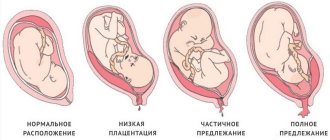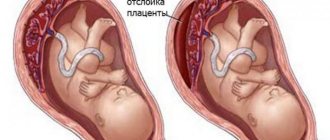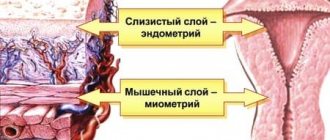Many pregnant women, when undergoing ultrasound diagnostics, quite often hear the verdict - hypertonicity of the myometrium on the posterior wall. Particularly suspicious expectant mothers panic at unfamiliar words, and when the doctor explains, their anxiety grows even more. After all, the main threat in this case is premature birth.
In post-Soviet countries, ultrasound specialists often mention such a terrible hypertonicity of the myometrium, although as such a diagnosis simply does not exist in obstetrics, unless we are talking about the birth itself. During this process, sometimes the uterus can become tense.
As everyone knows, the female reproductive organ itself is muscular. Like any other muscle groups in the body, it can be in some tone. The uterus certainly cannot completely relax or contract.
Local hypertonicity of the posterior wall of the uterus is not such. If a specialist tells you about this in the first trimester of pregnancy, unfortunately, he cannot be called a professional. It turns out that he knows nothing about the peculiarities of the uterus.
If you really had this problem, the pain would be quite severe.
Why does the tone of the posterior wall of the uterus develop during pregnancy?
The uterus is formed by muscle tissue, so minimal tension is present in the organ, even when the woman is completely healthy. And if a slight tone is detected at the point of contact of the embryo with the wall of the uterus, this indicates that implantation is successful.
When the entire uterus is tense, we talk about general tone, and if the tension covers a separate area of it, we talk about local tone. The latter is classified into hypertonicity along the posterior and anterior wall.
Obstetricians-gynecologists regard this pathology as a fairly serious disorder. A large number of factors can cause the development of tone in the posterior wall of the uterus in an expectant mother:
- diseases that directly affect the tissues of the uterus - fibroids, endometriosis. Problems with bearing a child due to high tone can also arise due to the unusual anatomical structure of the reproductive organ (saddle-shaped, bicornuate uterus);
- progesterone deficiency. Hormone deficiency occurs if a pregnant woman’s genitals are underdeveloped or her body has too high a level of male sex hormones (androgens);
- viral infections. The aggressive activity of pathogenic microorganisms weakens general immunity, on which the normal state of the uterus directly depends. Due to the presence of infection in the external genital area, itching and burning occurs, the composition of vaginal discharge changes;
- polyhydramnios and oligohydramnios. Deviation of the volume of amniotic fluid from normal indicators has a bad effect on the condition of the muscle layer specifically on the posterior wall of the uterus;
- regular exposure to stress. A depressed state and nervousness not only puts the uterus in a state of constant tension, but also disrupts the general well-being of the pregnant woman;
- stretching of the muscles of the reproductive organ. Almost always present if the fruit is too large, if there are several fruits, as well as with severe polyhydramnios;
- foci of inflammation in the area of the uterus and ovaries. The condition is accompanied by alternating tension and relaxation of different parts of the uterus;
- too much physical activity. Obsessive exercise or heavy lifting puts the posterior wall of the uterus under constant tension;
- Rh conflict between mother and fetus. If the mother’s body begins to reject the child, the first thing that will happen is the tone of the uterus will increase;
- past abortions, miscarriages and premature births;
- slowing of intestinal motility due to pregnancy. Gases accumulate in its cavity and the swollen organ puts pressure on the uterus, which provokes an increase in its tone.
Proper nutrition
Thanks to a healthy diet, it will be possible to improve the general well-being of the pregnant woman and have a beneficial effect on the tone of the uterus. Some phenomena caused by poor nutrition can lead to diarrhea, flatulence and constipation. It is these phenomena that most often provoke the tone of the reproductive organ.
Expectant mothers are recommended to take a remedial course of intestinal bacterial flora
It is recommended to include foods containing vitamin complexes and useful minerals in your diet. It is advisable to protect yourself from fried foods and processed foods.
Doctors recommend maintaining a healthy diet throughout pregnancy. You should also protect yourself from bad habits: drinking alcohol and smoking. This will have a beneficial effect on the condition of the expectant mother and her unborn baby.
How does the tone of the posterior wall of the uterus manifest during pregnancy?
Staying the posterior wall of the reproductive organ in good shape is most often an asymptomatic phenomenon. In such cases, pathology is detected only after ultrasound. However, according to observations of a certain part of pregnant women, this disorder is accompanied by clearly defined symptoms:
- painful sensations in the lower abdomen, which radiate to the lower back and intensify significantly as soon as the woman physically strains. The pains are very similar to those that accompany menstruation;
- feeling of tension in the uterus;
- a feeling of “fossilization” of the uterus in late pregnancy;
- spotting mixed with blood or heavy bleeding from the genital tract.
The last sign of tone along the posterior wall is the most dangerous. If blood appears, you should immediately call an ambulance and remain calm until it arrives. The developments of modern medicine make it possible to maintain pregnancy in most cases.
Diagnostic measures
The diagnostic procedures carried out allow us to determine with 100% probability the pathological changes that have occurred in the reproductive organ of a pregnant woman. Such activities are carried out by an experienced medical specialist using special instruments.
How does it feel?
First of all, the doctor will collect an anamnesis. It is important for the patient to talk about the unpleasant sensations he feels. These include:
- aching pain in the lower abdomen;
- unpleasant compression in the perineum;
- sudden abdominal tension;
- lower back pain;
- frequent urge to urinate.
In especially severe cases, pain is accompanied by bloody discharge. In this condition, you should immediately seek help from a doctor, as this can lead to miscarriage. Also, cramping pain lasting more than one minute will serve as an alarming signal.
Methods for diagnosing the tone of the posterior wall of the uterus during pregnancy
Ultrasound diagnostics will allow you to confirm or refute the preliminary conclusion of an obstetrician-gynecologist about hypertonicity of the posterior wall of the uterus. During the procedure, the specialist analyzes the condition of the reproductive organ down to the smallest detail: assesses the thickness of its walls, the degree and area of tension in the muscle layer. Hypertonicity always affects the appearance of the uterus, distorting its shape to some extent. The strength of the tone depends on which wall the embryo is attached to.
Specialists with extensive experience will learn about the tone of the posterior wall through routine palpation of the expectant mother’s abdomen.
In addition to examining the uterus, the doctor must pay attention to the cervix. Its pronounced shortening, as well as premature opening of the uterine pharynx, indicates a high probability of miscarriage or premature birth.
Treatment methods
After diagnostic measures, the doctor prescribes effective therapy, thanks to which it will be possible to maintain the pregnancy.
Under no circumstances should you self-medicate, as this can lead to serious consequences.
Who prescribes treatment?
If you experience unpleasant symptoms and suspect the development of pathology, you should contact your obstetrician-gynecologist. Thanks to his recommendations, it will subsequently be possible to prevent the development of a pathological process in the reproductive organ of a pregnant woman.
What medications are prescribed?
Mandatory therapy involves the use of sedatives. The most commonly prescribed medications are valerian or motherwort. If these drugs are ineffective, the specialist prescribes Nozepam.
If progesterone deficiency is responsible for the increased tone of the reproductive organ, the following drugs are prescribed:
- Utrozhestan;
- Duphaston.
Also, in most cases, patients are prescribed Magne B6, thanks to which they can compensate for the lack of vitamin B in the body.
Treatment with suppositories
Doctors usually prescribe Papaverine in suppositories. This is an effective remedy that has a beneficial effect on the pregnant woman’s body. In case of increased tone, it is recommended to use the drug according to the attached instructions.
Duration of treatment
The therapy provided depends on the nature and severity of the pathology. An experienced doctor determines the treatment period based on the patient’s condition and the diagnostic measures performed.
Why is the tone of the posterior wall of the uterus dangerous during pregnancy?
Pathology promises bitter consequences for a woman. In the short term, hypertonicity can cause spontaneous abortion, and in the later stages, premature birth of the baby:
- Most often, pathological tension of the uterus occurs at the very beginning of pregnancy. Due to the tone along the posterior wall, the fertilized egg cannot always attach to the wall of the uterus and, as a result, is rejected.
- The tone of the anterior or posterior wall of the uterus can disrupt the blood supply to the fetus, resulting in hypoxia.
- Extreme tension on the back wall disrupts the functionality of the child's seat. Practice shows that with serious placental abruption, miscarriage or premature birth is inevitable.
In most cases, tension covers the uterus on the eve of childbirth. These are training contractions that cannot harm the mother and fetus. In this way, the body adjusts to the upcoming birth.
Exercises
Your doctor may recommend either reducing or increasing physical activity. Regarding uterine hypertonicity, the second option is often recommended.
Increasing physical activity is primarily recommended for those people who have been actively involved in sports and exposed themselves to physical activity.
Due to pregnancy, this category of people dramatically change their lifestyle from active to passive, due to which the tone of the uterus is activated. To prevent this, doctors recommend moving more, namely:
- spontaneous movements in a home environment accompanied by pleasant music;
- walking in the fresh air;
- swimming in the pool;
- yoga classes;
- breathing exercises.
Exercise should be enjoyable, in which case it will lead to positive changes in the pregnant woman’s body.
.
Is it possible to cure the tone of the posterior wall of the uterus during pregnancy?
If there are signs of uterine hypertonicity, it is important to take timely measures to eliminate it. Treatment can be carried out both at home and within the walls of a medical institution.
While waiting for an ambulance, the expectant mother should try to relieve or reduce the tension of the uterus in the following way:
- breathe deeply and steadily to calm down;
- sit comfortably in a horizontal plane (for example, lie on your side with your knees slightly bent);
- relax the muscles of the face and body to the maximum;
- If your health allows, you need to get on all fours. In this position, the uterus will be in a free position. To further relax, you can perform the “Cat” exercise: round your back while lowering your heads down.
Please note that you should seek medical help even if you managed to return the uterus to a relaxed state on your own. Episodic cases of hypertonicity are a good reason to undergo a full examination and select the most effective and safe therapeutic methods to prevent a similar condition in the future.
What a specialist can recommend:
- hormonal treatment (if it is determined that the uterus is tense due to progesterone deficiency);
- sedatives (especially effective if the tone arises due to the woman’s anxious state);
- antispasmodics;
- magnesium-containing medications (normalize metabolic processes that are disrupted in the presence of tone);
- mode of activity restriction, i.e. constant stay in bed.
How to prevent the development of tone in the posterior wall of the uterus during pregnancy
Experienced obstetricians and gynecologists say that pregnant women who sleep enough, eat a nutritious and varied diet, try not to get into stressful situations and carefully dose physical activity are less at risk of developing local hypertonicity.
Finally, here are some useful recommendations for expectant mothers:
- attend all scheduled examinations at the antenatal clinic;
- avoid high physical activity, especially those that strain the abdominal muscles;
- maintain an even emotional state;
- eliminate the risk of hypothermia;
- plan your pregnancy responsibly: undergo a full medical examination and treat all pathologies of the reproductive system before the date of expected conception.










